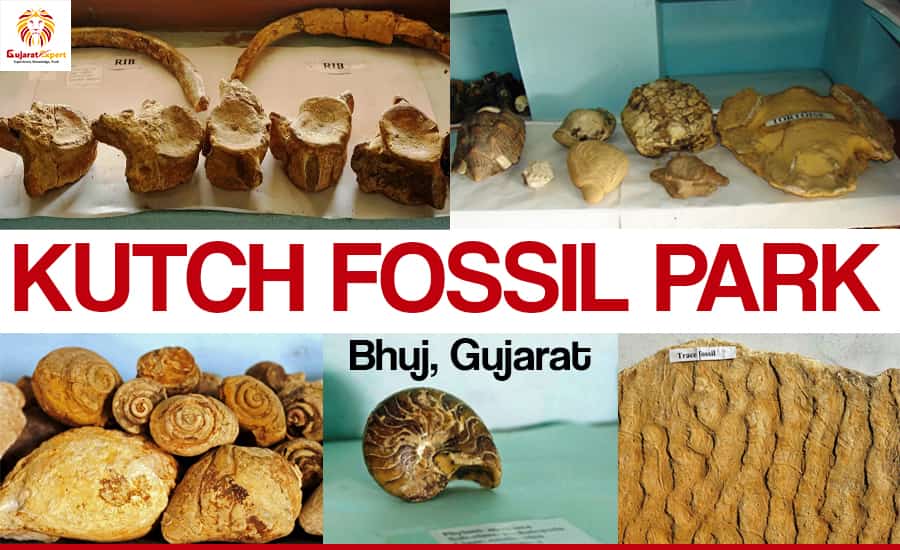Located approximately 56 kilometers from Bhuj in Gujarat, India, Kutch Fossil Park is an extraordinary destination for those interested in paleontology. Established in 2002 by Mohan Singh Sodha, an army veteran with a profound passion for fossils, this park offers a fascinating glimpse into the prehistoric life that once thrived in the region. With its unique collection of fossils and commitment to education, Kutch Fossil Park is a hidden gem for both locals and tourists.
Historical Background
The origins of Kutch Fossil Park trace back to the 1970s when Mohan Singh Sodha discovered an ammonite fossil. This pivotal moment ignited his lifelong fascination with paleontology. Over the next several decades, Sodha dedicated himself to collecting a wide array of fossils, transforming his passion into a public resource. In 2002, he established the park, showcasing his extensive collection to educate visitors about the region’s rich geological history.

Fossil Collection and Exhibits
Kutch Fossil Park boasts a diverse collection that spans various geological eras. The exhibits fill two small rooms but are rich in significance and variety. Some of the key highlights include:
1. Marine Fossils
Among the most notable exhibits are marine fossils, which include:
- Ammonites: These extinct marine mollusks, characterized by their spiral-shaped shells, are central to the park’s collection and date back to the Jurassic and Cretaceous periods.
- Belemnites: Related to modern squid, these cephalopods have bullet-shaped internal shells and offer insights into ancient marine life.
- Nautilus: The living relative of ammonites, nautilus fossils provide a glimpse into the evolutionary history of cephalopods.
- Brachiopods and Echinoderms: Representing ancient marine ecosystems, these fossils include various types of shellfish and organisms like starfish and sea urchins.
2. Dinosaur Fossils
The park features a remarkable exhibit of a dinosaur egg, along with other fossilized remains. This display captivates visitors and highlights the paleontological significance of the area, emphasizing the diversity of life that once inhabited the Earth.
3. Plant Fossils
Ancient plant fossils are also part of the collection, illustrating the vegetation that thrived in the region during different geological periods. These fossils offer valuable insights into the ecological history of the Kutch area.
4. Reptiles and Other Animals
Fossils from reptiles and various ancient animals enrich the park’s offerings, showcasing the biodiversity that existed in the region throughout history.
5. Recent Discoveries
In a noteworthy development, Mohan Singh Sodha recently discovered a sea cow fossil, which was reconstructed with assistance from the Roorkee Institute of Technology. This species, named Dommingia Sodhae in his honor, underscores the ongoing significance of the park as a site for paleontological research.
- Also Read: Best Places to Visit in Bhuj
Visitor Experience
1. Eco-Friendly Environment
Kutch Fossil Park is situated in a tranquil desert setting, away from the urban sprawl of Bhuj. The entrance is adorned with fossil decorations, providing a welcoming atmosphere. Inside, the park offers picturesque views of the surrounding landscape, making it an ideal spot for picnics and relaxation.
2. Educational Opportunities
While Kutch Fossil Park may lack the extensive informational displays found in larger museums, it provides an intimate and engaging educational experience. Visitors are encouraged to explore the exhibits and learn about fossils through direct interaction. This hands-on approach fosters curiosity and inspires questions about the specimens on display.
3. Timings and Entry
The park is open during specific hours: from 10 AM to 12 PM and 3 PM to 6 PM. Importantly, entry is free, and the park operates primarily on donations, allowing more visitors to appreciate the wonders of paleontology without financial barriers.
4. Accessibility
Reaching Kutch Fossil Park is convenient, as visitors can easily travel by bus or cab from Bhuj. The short travel time enhances its appeal, making it a perfect day trip for those looking to blend adventure with education.
Significance in Paleontology
Kutch Fossil Park occupies a unique position in India’s paleontological landscape. While other fossil museums exist, Kutch stands out due to its personal touch, stemming from Mohan Singh Sodha’s dedication and passion. The park serves as an essential educational resource, raising awareness about the significance of fossils in understanding Earth’s history and the evolution of life.
Additionally, the park’s ongoing research and discoveries contribute to the broader scientific community. The recent identification of Dommingia Sodhae highlights the potential for further paleontological research in the Kutch region, making it a point of interest for both scientists and enthusiasts alike.
Conclusion
Kutch Fossil Park is not just a collection of fossils; it represents a testament to one man’s commitment to paleontology and his desire to share that passion with the world. With its unique exhibits, serene environment, and educational opportunities, the park is a must-visit destination for anyone traveling to Bhuj or the Kutch region. Whether you are a seasoned fossil enthusiast or simply curious about the natural world, Kutch Fossil Park offers a memorable experience that highlights the wonders of our planet’s geological history. Its free entry and dedication to community engagement make it an accessible and enriching destination for all.
- Check out: Bhuj Sightseeing Tour
